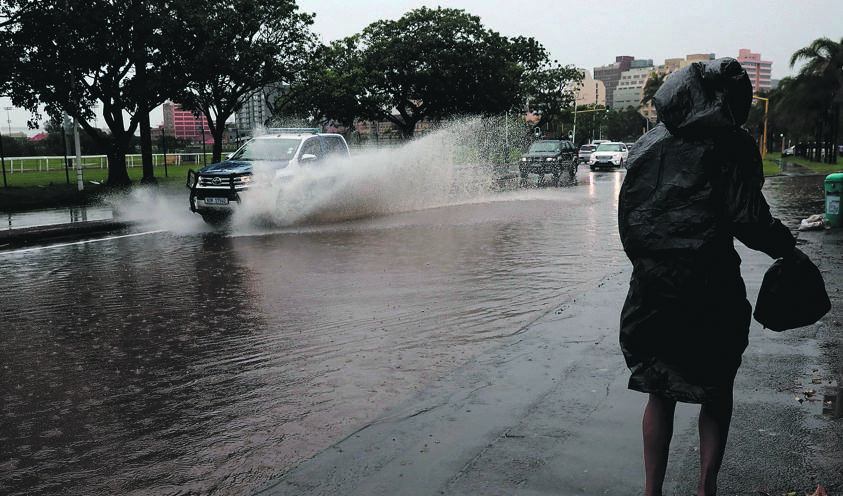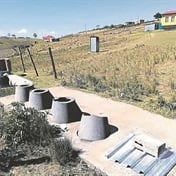
Major storm systems will continue to wreak havoc in KwaZulu-Natal (KZN) unless regional government and residents change their behaviour.
Poorly managed and defunct municipalities, illegal dumping, littering, massive underspending on repairs and maintenance, and a lack of real consequence management against officials failing to deliver basic services at municipal level all contribute to the devastation that occurs during inclement weather, spurred on by climate change.
While the cost to the economy has not yet been fully quantified, the heavy rainfall in eThekwini this April, which claimed 90 lives, came with a price tag in excess of R600 million.
eThekwini Municipality said on Friday that since October 25, when the latest bout of bad weather started, 19 people had died.
Thirteen of the deaths were due to lightning strikes, two were from drowning, two from a collapsed wall, and another two people died when their homes collapsed during the New Hanover tornado.
The Durban Chamber of Commerce and Industry said on Friday that the damage to property and loss of productivity, mainly due to ageing and inadequately maintained infrastructure, was “disastrous and unsustainable” and had a negative impact on economic activity as the festive season nears.
The chamber said there was a need for a serious review of stormwater drainage systems, “especially related to our local and provincial road networks”, citing the indefinite closure of a portion of the M4 between uMhlanga and Sibaya casino precinct owing to a section of the road collapsing on Monday.
The magnitude and frequency of the storms is “proving to be a massive risk to the growth and development of the local economy”, with a “major challenge being the inability to transport and deliver goods and services to various destinations due to flooding and traffic congestion”, said the chamber.
It urged local and provincial government to urgently share its disaster management plan with all stakeholders.
Tim Tyrrell, KZN provincial manager of the Organisation Undoing Tax Abuse (Outa), told City Press that together with climate change, what could not be ignored was that the municipalities most affected by the recent bout of heavy rainfall were some of the worst-performing in the province.
Research undertaken by Outa into eThekwini Municipality found that while the salary bill continued to rise at more than double the consumer price index, at an average of 12% per annum between 2016 and last year the municipality underspent on repairs and maintenance by R10.2 billion.
On Thursday, eThekwini Mayor Mxolisi Kaunda and KZN’s Cooperative Governance and Traditional Affairs (Cogta) MEC Sipho Hlomuka agreed that more needed to be done to fix infrastructure.
Hlomuka said rampant littering and illegal dumping blocked drainage systems and was “a phenomenon across the province”.
The SA Institute of Civil Engineers (Saice) told City Press that while climate change was no doubt a factor in the frequency and intensity of incidents of severe weather, poor planning, design and lack of maintenance on the part of government also needed to be addressed.
“General lack of maintenance of storm gullies and drains leads to severe blockages. Patently, if the drainage is not optimally operable, even mild storms within the original design parameters lead to flooding,” said Tony Smith, committee member of the Saice joint structural division.
Smith pointed out that when it came to construction of state-funded housing, the rigorous standards used in private development were simply not enforced.
KZN-based consulting civil engineer Francois du Toit, who has worked in both the public and private sector and specialises in rural development, said major problems related to infrastructure deficiencies in the province stemmed from homes constructed in drainage channels or flood plains and blockage of drainage systems owing to lack of maintenance and illegal dumping.
Du Toit said one of the greatest failures of government and municipalities was not identifying suitable land for informal housing developments.
“These informal housing developments are generally established by poor and disadvantaged people who settle on any vacant land, preferably close to town or places of employment.
“The land they occupy is vacant for a reason, as it is normally deemed inappropriate or dangerous for development. It includes drainage channels and steep inclines.”
KZN Cogta spokesperson Lennox Mabaso said owing to the legacy of apartheid there were still residents living in mud huts and poorly constructed houses in unsuitable areas.
“The challenge is very serious. The democratic government is addressing the apartheid spatial planning and has since passed laws that will go a long way towards mitigating the apartheid-era disasters which have caused people to live in informal dwellings and on flood plains.”
Mabaso said it was incorrect to create a link between badly performing municipalities and those affected by the inclement weather over the past week, which he called “acts of God”.
“Poor performance varies. It can be in governance, public participation and not necessarily in infrastructure development. At times you discover that a municipality is doing well on service delivery but is found wanting on compliance areas and not on material matters.”
Municipalities had increased efforts to enforce building regulations but urban migration and illegal occupation of land created further challenges, said Mabaso.
Government urges the public to insure their properties and assets if they can afford it, he added.
According to a provincial cabinet statement released on Wednesday, the municipalities identified as most affected by severe weather were AbaQulusi (Vryheid), eThekwini metro, Jozini, Pietermaritzburg-based uMgungundlovu district, uMzinyathi district based in Dundee, Ilembe district incorporating KwaDukuza and Ballito, Ixopo-based Harry Gwala district incorporating Kokstad and Underberg, as well as uThukela district headquartered in Ladysmith.
Last month the Public Affairs Research Institute (Pari) published a study titled Mind the Gap: Section 139 Interventions in Theory and in Practice.
The study looked into the state of local government through the lens of section 139 of the Municipal Finance Management Act. The section dictates when a municipality should be placed under administration.
Pari’s data revealed that the majority of the municipalities listed by the KZN cabinet as affected had been placed under administration.




 Publications
Publications
 Partners
Partners









